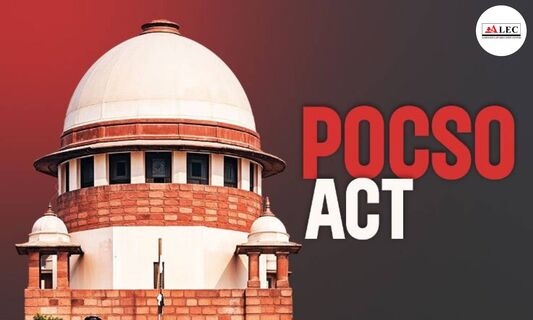Recently the Hon’ble Supreme Court has set aside a Madras High Court judgment which held that mere storage of child pornographic material without any intention to transmit the same was not an offence under the Protection of Children from Sexual Offences Act (POCSO Act) 2012. The Hon’ble Supreme Court held that the storage of such material, without deleting or without reporting the same, would indicate an intention to transmit.
What is POCSO?
The Protection of Children from Sexual Offences (POCSO) Act, 2012 is a comprehensive law enacted by the Indian government to protect children (persons below the age of 18) from various forms of sexual abuse, including sexual assault, sexual harassment, and pornography. The Act provides for child-friendly procedures for reporting, recording evidence, investigating, and speedy trials through special courts. It also lays out stringent punishments for offenders, ensuring the protection of children’s rights and well-being.
Why Was POCSO Legislated?
The POCSO Act was legislated to address gaps in the Indian Penal Code (IPC) and other existing laws, which were inadequate in dealing with sexual crimes against children. The primary reasons for legislating the POCSO Act are:
- Lack of Adequate Legal Protections for Children
Before POCSO, the IPC did not cover all forms of child sexual abuse. For example, non-penetrative sexual assault, child sexual harassment, and child pornography were not specifically covered under the IPC, leaving many victims without proper legal recourse. POCSO filled this gap by comprehensively defining various sexual offences involving children.
- Compliance with International Obligations
India is a signatory to the United Nations Convention on the Rights of the Child (UNCRC), which mandates member countries to take legislative measures to protect children from all forms of exploitation, including sexual exploitation. The POCSO Act was legislated to fulfil India’s obligations under this international convention, as well as other global commitments like the Optional Protocol on the Sale of Children, Child Prostitution, and Child Pornography.
- Child-Friendly Legal Procedures
One of the major objectives behind the POCSO Act is to make the legal process less intimidating and more accessible for children. The Act mandates special procedures, such as:
- Mandatory Reporting: It is mandatory for any person, including police, parents, or teachers, to report instances of child sexual abuse.
- Child-Friendly Courtrooms: The Act ensures that children are not re-traumatized during legal proceedings. It includes provisions such as recording testimony in a safe environment, avoiding direct confrontation with the accused, and limiting the number of court appearances for the child.
- Addressing Digital and Online Crimes Against Children
With the rise of the internet, child exploitation, particularly child pornography, became a growing concern. The POCSO Act criminalizes the use of children for pornographic purposes, as well as the possession, distribution, and storage of child sexual abuse material (CSAM). This recent aspect has been further strengthened by the Supreme Court ruling that even the mere storage of such material constitutes a crime.
- Gender-Neutral Provisions
Unlike the IPC, which historically had a gender-specific approach to sexual crimes (e.g., rape laws only protected women), the POCSO Act is gender-neutral. It provides protection to all children, regardless of their gender, recognizing that boys, girls, and transgender children can all be victims of sexual abuse.
What is the law in question?
In present case the Bench expanded the interpretation of Section 15 of the POCSO Act, which deals with the “Punishment for storage of pornographic material involving child”.
Originally, the provision was restricted to cases where a person stored child pornographic material “for commercial purposes”. In 2019, the POCSO Act was amended to introduce three connected offences under Sections 15(1), (2) and (3) with increasing grades of punishment — from fines to a three to five year jail sentence. These punish
- Any person, who stores or possesses pornographic material in any form involving a child, but fails to delete or destroy or report the same to the designated authority, as may be prescribed, with an intention to share or transmit child pornography;
- Any person, who stores or possesses pornographic material in any form involving a child for transmitting or propagating or displaying or distributing in any manner at any time except for the purpose of reporting, as may be prescribed, or for use as evidence in court; and
- Any person, who stores or possesses pornographic material in any form involving a child for commercial purpose.
The court referred to these as “inchoate” offences , which means offences that are in anticipation or preparation for committing a further criminal act. It was also held that Section 15 was not limited to punishing the sharing or transmitting of child pornographic material, and could even be used to punish the “intent” to commit such an act.
Conclusion
The Supreme Court's ruling on the storage of child pornography under the POCSO Act reinforces India's commitment to protecting children from sexual exploitation. By interpreting the law to penalize even the passive storage of child sexual abuse material, the Court has sent a clear message that any involvement with child pornography, no matter how indirect, will not be tolerated. The judgment also highlights the evolving nature of digital crimes and the need for a comprehensive legal response to protect children in both the physical and virtual worlds.
You can also read the latest judgment by visiting [Latest Judgment].
For more information, visit [ALEC Enquiry].

